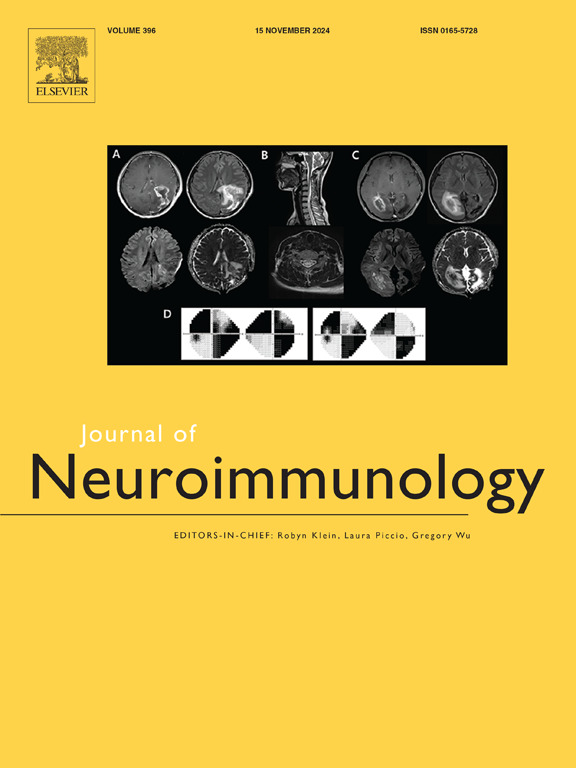补充 NAD+ 可缓解体内和体外慢性睡眠限制(CSR)诱导的小胶质细胞促炎症。
IF 2.9
4区 医学
Q3 IMMUNOLOGY
引用次数: 0
摘要
睡眠不足是世界范围内的一个重大健康问题,可诱发中枢神经系统(CNS)的多种神经发育障碍。睡眠不足(SD),尤其是长期睡眠不足,会导致认知和记忆丧失,并加重神经退行性疾病的负担。小胶质细胞是主要的炎症主导胶质细胞,在睡眠剥夺诱发的神经损伤中发挥着至关重要的作用。烟酰胺腺嘌呤二核苷酸(NAD+)是一种氧化还原反应辅酶,在小胶质细胞中具有抗炎和保护线粒体的作用。NAD+是否能通过调节小胶质细胞的功能来缓解SD诱发的神经系统疾病仍是未知数。在本研究中,我们设计了一个体内和体外模型来评估 NAD+ 对慢性睡眠限制(CSR)的神经保护作用,并进一步研究其潜在机制。通过行为测试和免疫荧光染色来研究认知障碍和小胶质细胞活化。生化实验分析了氧化状态和可能的机制。体外数据用于验证体内数据。我们的结果表明,补充 NAD+ 可以抑制体内促炎细胞因子的表达,从而缓解 CSR 引起的认知功能下降和微胶质细胞活化反应。服用 NAD+ 还能减少氧化应激和小胶质细胞线粒体损伤。体外实验结果表明,NAD+ 可抑制 ROS 的产生,并促使 M1 向 M2 表型转化。应用 STING 拮抗剂 H151 验证了 NAD+ 治疗可部分通过调节小胶质细胞中的 cGAS-STING 通路缓解神经炎症。我们的研究结果表明,补充 NAD+ 是一种治疗睡眠障碍引起的神经系统问题的有效方法,而 cGAS-STING 通路可能是小胶质细胞促炎的关键调节因子。本文章由计算机程序翻译,如有差异,请以英文原文为准。
NAD+ supplement relieved chronic sleep restriction (CSR)-induced microglial proinflammation in vivo and in vitro
Sleep insufficiency is a significant health problem worldwide and can induce multiple neurodevelopmental disorders in the central nervous system (CNS). Sleep deprivation (SD), especially chronic SD, leads to cognition and memory loss and worsens neurodegenerative disease liability. Microglia are the main inflammation-dominant glia and play a crucial role in SD-induced neurological impairments. Nicotinamide adenine dinucleotide (NAD+) is a redox reaction coenzyme that exerts anti-inflammatory and mitochondria-protective effects in microglia. Whether NAD+ mitigated SD-induced neurological disorders by regulating microglial functions is still unknown. In the current study, we designed an in vivo and in vitro model to evaluate the neuroprotective effect of NAD+ on chronic sleep restriction (CSR) and further investigate the underlying mechanisms. Behavioral tests and immunofluorescence staining were applied to investigate the cognition impairments and microglial activation. Biochemical experiments were tested to analyze the oxidative status and possible mechanism. In vitro data were used to verify the in vivo data. Our results displayed that NAD+ supplement mitigated CSR-induced cognitive decline and microglial activation response by suppressing the expression of pro-inflammatory cytokines in vivo. NAD+ administration also decreased oxidative stress and mitochondrial impairments in microglia. In vitro results showed that NAD+ treatment inhibited ROS production and prompted M1 conversion to M2 phenotype. cGAS-STING/NF-κB pathways were significantly activated but down-regulated by NAD+ administration. H151, a STING antagonist, was applied to validate that NAD+ treatment alleviates neuroinflammation partially by regulating cGAS-STING pathways in microglia. Our findings suggest that NAD+ supplement is a promising therapy for sleep disorders-induced neurological problems, and cGAS-STING pathway may act as a critical regulator in microglial proinflammation.
求助全文
通过发布文献求助,成功后即可免费获取论文全文。
去求助
来源期刊

Journal of neuroimmunology
医学-免疫学
CiteScore
6.10
自引率
3.00%
发文量
154
审稿时长
37 days
期刊介绍:
The Journal of Neuroimmunology affords a forum for the publication of works applying immunologic methodology to the furtherance of the neurological sciences. Studies on all branches of the neurosciences, particularly fundamental and applied neurobiology, neurology, neuropathology, neurochemistry, neurovirology, neuroendocrinology, neuromuscular research, neuropharmacology and psychology, which involve either immunologic methodology (e.g. immunocytochemistry) or fundamental immunology (e.g. antibody and lymphocyte assays), are considered for publication.
 求助内容:
求助内容: 应助结果提醒方式:
应助结果提醒方式:


